- Home
- James S. A. Corey
Tiamat's Wrath
Tiamat's Wrath Read online
Copyright
This book is a work of fiction. Names, characters, places, and incidents are the product of the author’s imagination or are used fictitiously. Any resemblance to actual events, locales, or persons, living or dead, is coincidental.
Copyright © 2019 by Daniel Abraham and Ty Franck
Cover design by Lauren Panepinto and Kirk Benshoff
Cover art by Daniel Dociu
Cover copyright © 2019 by Hachette Book Group, Inc.
Hachette Book Group supports the right to free expression and the value of copyright. The purpose of copyright is to encourage writers and artists to produce the creative works that enrich our culture.
The scanning, uploading, and distribution of this book without permission is a theft of the author’s intellectual property. If you would like permission to use material from the book (other than for review purposes), please contact [email protected]. Thank you for your support of the author’s rights.
Orbit
Hachette Book Group
1290 Avenue of the Americas
New York, NY 10104
orbitbooks.net
First Edition: March 2019
Orbit is an imprint of Hachette Book Group.
The Orbit name and logo are trademarks of Little, Brown Book Group Limited.
The publisher is not responsible for websites (or their content) that are not owned by the publisher.
The Hachette Speakers Bureau provides a wide range of authors for speaking events. To find out more, go to www.hachettespeakersbureau.com or call (866) 376-6591.
Library of Congress Cataloging-in-Publication Data
Names: Corey, James S. A., author.
Title: Tiamat’s wrath / James S. A. Corey.
Description: First Edition. | New York, NY : Orbit, 2019. | Series: The Expanse ; book 8
Identifiers: LCCN 2018054213| ISBN 9780316332873 (hardcover) | ISBN 9780316332866 (ebook (open))
Subjects: | GSAFD: Science fiction.
Classification: LCC PS3601.B677 T53 2019 | DDC 813/.6—dc23
LC record available at https://lccn.loc.gov/2018054213
ISBNs: 978-0-316-33287-3 (hardcover), 978-0-316-33286-6 (ebook)
E3-20190208-JV-NF-ORI
Contents
Cover
Title Page
Copyright
Dedication
Prologue: Holden
Chapter One: Elvi
Chapter Two: Naomi
Chapter Three: Alex
Chapter Four: Teresa
Chapter Five: Elvi
Chapter Six: Alex
Chapter Seven: Bobbie
Chapter Eight: Naomi
Chapter Nine: Teresa
Chapter Ten: Elvi
Chapter Eleven: Alex
Chapter Twelve: Bobbie
Chapter Thirteen: Naomi
Chapter Fourteen: Teresa
Chapter Fifteen: Naomi
Chapter Sixteen: Elvi
Chapter Seventeen: Alex
Chapter Eighteen: Naomi
Chapter Nineteen: Elvi
Chapter Twenty: Teresa
Chapter Twenty-One: Elvi
Chapter Twenty-Two: Teresa
Chapter Twenty-Three: Naomi
Chapter Twenty-Four: Bobbie
Interlude: The Dancing Bear
Chapter Twenty-Five: Naomi
Chapter Twenty-Six: Elvi
Chapter Twenty-Seven: Teresa
Chapter Twenty-Eight: Naomi
Chapter Twenty-Nine: Elvi
Chapter Thirty: Bobbie
Chapter Thirty-One: Teresa
Chapter Thirty-Two: Bobbie
Chapter Thirty-Three: Alex
Chapter Thirty-Four: Elvi
Chapter Thirty-Five: Naomi
Chapter Thirty-Six: Teresa
Chapter Thirty-Seven: Alex
Chapter Thirty-Eight: Naomi
Chapter Thirty-Nine: Elvi
Chapter Forty: Teresa
Chapter Forty-One: Naomi
Chapter Forty-Two: Alex
Chapter Forty-Three: Elvi
Chapter Forty-Four: Naomi
Chapter Forty-Five: Teresa
Chapter Forty-Six: Elvi
Chapter Forty-Seven: Naomi
Chapter Forty-Eight: Teresa
Chapter Forty-Nine: Naomi
Chapter Fifty: Elvi
Epilogue: Holden
Acknowledgments
Discover More James S. A. Corey
By James S. A. Corey
To George R. R. Martin
Good mentor, better friend
Prologue: Holden
Chrisjen Avasarala was dead.
She’d passed in her sleep on Luna four months earlier. A long, healthy life, a brief illness, and she left humanity very different than she’d found it. The newsfeeds all had obituaries and remembrances prerecorded and ready to spin out across the thirteen hundred systems to which humanity was heir. The chyrons and headlines had been hyperbolic: The Last Queen of Earth and Death of a Tyrant and Avasarala’s Final Farewell.
No matter what they said, they hit Holden just as hard. It was impossible to imagine a universe that wouldn’t bow to the little old woman’s will. Even when the confirmation came to Laconia that the reports were true, Holden still believed deep in his bones that she was out there somewhere, irritated and profane and pushing herself past all human limits to bend history just another fraction of a degree away from atrocity. It was almost a month between the moment he heard the news and the first time he let himself accept that it was true. Chrisjen Avasarala was dead.
But that didn’t mean she was finished.
A state funeral had been planned on Earth before Duarte intervened. Avasarala’s time as secretary-general of the United Nations had been a critical period in history, and her service not only to her world but to the whole human project had earned her a place of honor that could never be forgotten. The high consul of Laconia thought it only right and proper that she find her final resting place at the heart of the new empire. The funeral would be at the State Building. A memorial would be built to her so that she would never be forgotten.
The part where Duarte was complicit in the vast slaughter on Earth that defined Avasarala’s career got skipped over. History was in the process of being rewritten by the winners. Holden was pretty sure that even though it didn’t make it into the press releases and state newsfeeds, everyone remembered that she and Duarte had been on opposite sides, back in the day. And if they didn’t, he certainly did.
The mausoleum—her mausoleum, since there wasn’t anyone else of sufficient stature to share it with her yet—was white stone polished micron-smooth. The great doors were closed now, the service concluded. A portrait of Avasarala filled the center panel on the north face of the structure. It was etched into the stone along with the dates of her birth and death and a few lines of poetry he didn’t recognize. The hundreds of chairs arrayed around the podium where the priest had spoken were only about half-filled now. People had come from across the empire to be here, and now that they were, they mostly broke into little clumps with whoever they already knew. The grass around the crypt wasn’t like the stuff back on Earth, but it filled the same ecological niche and behaved similarly enough that they called it grass. The breeze was warm enough to be comfortable. With the palace behind him, Holden could almost pretend that he might walk out to the wilderness beyond the palace grounds and go wherever he chose.
His clothes were of Laconian military cut, blue with the spread wings that Duarte had picked for his imperial icon. The collar was high and stiff. It scraped the skin along the side of Holden’s neck. The place where his insignia of rank would have gone was blank. Empty was apparently the symbol of the honored prisoner.
Holden wondered what exactly the escalation tree looked like when he said no. That he was a free man, and rejected the hospitality of the palace. Whatever it was, he was pretty sure it had already been practiced and rehearsed. And he probably wouldn’t enjoy it.
“In a minute,” Holden said. “I just want to…” He gestured vaguely at the tomb as if the inevitability of death was a kind of universal hall pass. A reminder that all human rules were tentative.
“Of course, sir,” the guard said, and faded back into the crowd. Holden didn’t have any sense that he was free, though. Unobtrusively confined was as much as he could hope for.
One woman stood alone at the base of the mausoleum, looking up at Avasarala’s portrait. Her sari was a vibrant blue that was just close enough to the Laconian color scheme to be polite and just far enough from it to make it perfectly clear that the politeness was insincere. Even if she hadn’t looked like her grandmother, the subtle-not-subtle fuck you would have identified her. Holden ambled over.
Her skin was darker than Avasarala’s had been, but the shape of her eyes when she glanced over at him and the thinness of her smile were familiar.
“I’m sorry for your loss,” Holden said.
“Thank you.”
“We haven’t been introduced. I’m—”
“James Holden,” the woman said. “I know who you are. Nani talked about you sometimes.”
“Ah. Well, that must have been something to hear. She didn’t always see things the way I did.”
“No, she did not. I’m Kajri. She called me Kiki.”
“She was an amazing woman.”
They were silent for the space of two long breaths together. The breeze made the fabric of Kajri’s sari ripple like a flag. Holden was about to step away when she spoke again.
“She would have hated this,” she said. “Hauled into the camp of her enemies to be celebrated now that she can’t crack their balls anymore. Co-opted as soon as she couldn’t fight back. You could power a planet by hooking a turbine to her right now. That’s how much she’s spinning in this grave.”
Holden made a small sound that could have been agreement.
Kajri shrugged. “Or maybe not. She might have just thought it was funny. I could never be sure with her.”
“I owed her a lot,” Holden said. “I didn’t always realize it at the time, but she did what she could to help me. I never got the chance to thank her. Or… I did, I guess, but I didn’t take it. If there’s anything I can do for you or your family…”
“You don’t seem to be in a position to do people favors, Captain Holden.”
Holden looked back at the palace. “Yeah, I’m not really at my best these days. But I wanted to say it all the same.”
“I appreciate the sentiment,” Kajri said. “And from what I’ve heard, you’ve managed to have some influence? The prisoner with the emperor’s ear.”
“I don’t know about that. I talk a lot, but I don’t know that anyone listens. Except the security detail. I assume they listen to everything.”
She chuckled, and it was a warmer, more sympathetic sound than he’d expected. “It isn’t easy, having no part of your life for just yourself. I grew up knowing that everything I said would be monitored, cataloged, filed, and judged for its potential to compromise me or my family. There’s a record in the intelligence service archives somewhere of every time I’ve had my period.”
“Because of her?” Holden said, nodding to the tomb.
“Because of her. But she gave me the tools to live through it too. She taught us to use everything shameful in our lives as a weapon to humiliate people who would diminish us. That’s the secret, you know.”
“What’s the secret?”
Kajri smiled. “The people who have power over you are weak too. They shit and bleed and worry that their children don’t love them anymore. They’re embarrassed by the stupid things they did when they were young that everyone else has forgotten. And so they’re vulnerable. We all define ourselves by the people around us, because that’s the kind of monkey we are. We can’t transcend it. So when they watch you, they hand you the power to change what they are too.”
“And she taught you that?”
“She did,” Kajri said. “But she didn’t know it.”
As if to prove the point, a guard moved across the grass toward them, keeping a respectful distance until he was sure they’d seen him and then gave them time to finish what they were saying before coming closer. Kajri turned to him, lifting her eyebrow.
“The reception is going to begin in twenty minutes, ma’am,” the guard said. “The high consul specifically hoped to meet you.”
“I wouldn’t dream of disappointing him,” she said with a smile Holden had seen before on other lips. Holden offered his arm, and Kajri took it. As they walked away, he nodded toward the tomb and the words written on it. IF LIFE TRANSCENDS DEATH, THEN I WILL SEEK FOR YOU THERE. IF NOT, THEN THERE TOO.
“It’s an interesting quote,” he said. “I feel like I should recognize it. Who wrote it?”
“I don’t know,” she said. “She only told us to put it on her grave. She didn’t say where it came from.”
Everyone who was anyone had come to Laconia. That was true on several levels. Duarte’s plan to shift the center of humanity away from Sol system to the heart of his own empire had found a level of cooperation and consent that shocked Holden at first and then left him with a permanent sense of mild disappointment in humans as a species. The most prestigious scientific research institutes had all moved their headquarters to Laconia. Four different ballet companies threw off centuries of rivalry to share the same Laconian Institute of Art. Celebrities and scholars rushed to new, palatial, state-subsidized estates in the capital city. There were already movies being made there. The soft power of culture set on speed scrub, ready to flood the networks and feeds with the reassuring messages of High Consul Duarte and the permanence of Laconia.
Business came too. Duarte had banks and office campuses prebuilt and ready for tenants. The Association of Worlds wasn’t just Carrie Fisk in a shitty office on Medina Station anymore. It was a cathedral in the center of the capital city with a lobby bigger than a hangar bay and stained glass walls that seemed to rise up forever. The Transport Union’s central authority was there too, in a lesser building with fewer amenities so that it was clear physically and socially who was in favor and who was on notice. Holden watched it all from the State Building that was his home and his prison, and it left him thinking of living on an island.
Within the boundary of the city, Laconia was cleaner, newer, brighter, and more controlled than most space stations Holden had been on. Just outside it was wilderness like he’d only seen in storybooks. Ancient forests and alien ruins that would take generations to tame and explore. Holden had heard gossip and rumors about the remnant technologies brought to shambling life by the early work with the protomolecule: boring worms the size of spacecraft, doglike repair drones that made no distinction between mechanism and flesh, crystalline caves with piezoelectric effects that induced hallucinations of music and crippling vertigo. Even as the capital city became synonymous with humanity as a whole, the planet around it stayed alien. An island of the profoundly familiar in a sea of we-don’t-understand-that-yet. In a way, it was reassuring that Duarte, for all his god-emperor reach, couldn’t achieve everything in just a few decades.
In another way, it was terrifying.
The reception hall was grand, but not overblown. If Laconia had been built in Duarte’s image, there was a weird thread of personal restraint in the high consul’s soul. However grand the city was, however overwhelming his ambitions, Duarte’s palatial compound and home wasn’t gaudy or even particularly ornate. The ballroom was all clean lines and a neutral palette that reached for elegance without being too concerned with what anyone thought. Couches and chairs were placed here and there where people could rearr
ange them. Young people in military uniform served glasses of wine and spiced tea. More than power, Duarte made everything that surrounded him seem born of confidence. It was a good trick, because even after Holden saw through it, it still worked.
Holden accepted a glass of wine from a young woman and strolled through the shifting crowd. A few of the people, he recognized instantly. Carrie Fisk of the Association of Worlds, holding court at a long table, with the governors of half a dozen colonies fighting to be the first one laughing at her jokes. Thorne Chao, the face of the most popular newsfeed coming out of Bara Gaon. Emil-Michelle Li in the flowing green dress that was her trademark when she wasn’t in a movie. And for every face Holden could put a name to, there were a dozen more who looked vaguely familiar.
He moved though the thin social fog of polite smiles and nods of recognition that fell short of actual engagement. He was here because Duarte wanted him seen here, but the Venn diagram of people eager to curry favor with the high consul but also willing to risk his displeasure by cozying up to the state’s highest-profile prisoner didn’t have much overlap.
But it did have some.
“I’m not drunk enough for this.”
Transport Union President Camina Drummer leaned against a standing table, her hands wrapped around a glass. Her face looked older in person. He could see the lines around her eyes and mouth more clearly when there weren’t a camera, a screen, and several billion kilometers between them. She shifted a degree, making room for him at the table, and he accepted the invitation.
“I’m not sure what drunk enough for this looks like,” he said. “Blackout drunk? Fighting drunk? Weeping-in-the-corner drunk?”
“You don’t seem even tipsy.”
“I’m not. I’m mostly off of alcohol these days.”
“Keeping your wits about you?”
“And it bothers my stomach.”
Drummer smiled and coughed out a laugh. “They’ve let the honored prisoner out among the people. Makes me think you’re not as useful to them anymore. Have they squeezed all the juice out of you?”
The way she said it, it could have been teasing between two old colleagues, fallen from power together and living in the twilight of political acceptability. Or it could have been something more. A way to ask if he’d been forced to betray the underground on Medina yet. If they’d decided to break him. Drummer knew as well as he did who was listening, even here.

 Leviathan Wakes
Leviathan Wakes Gods of Risk
Gods of Risk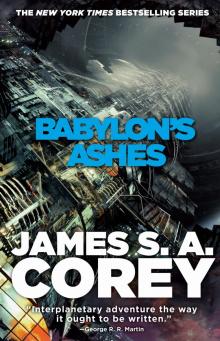 Babylon's Ashes
Babylon's Ashes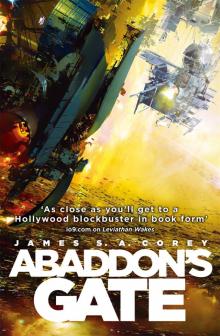 Expanse 03 - Abaddon’s Gate
Expanse 03 - Abaddon’s Gate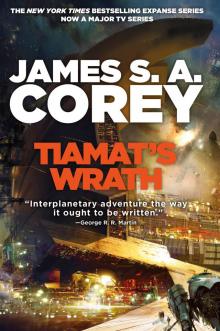 Tiamat's Wrath
Tiamat's Wrath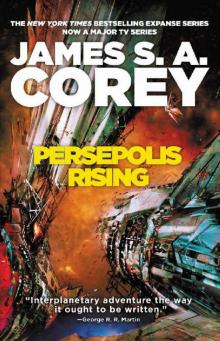 Persepolis Rising
Persepolis Rising The Butcher of Anderson Station
The Butcher of Anderson Station The Churn
The Churn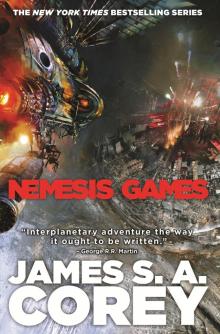 Expanse 05 - Nemesis Games
Expanse 05 - Nemesis Games Strange Dogs
Strange Dogs Honor Among Thieves: Star Wars
Honor Among Thieves: Star Wars Cibola Burn
Cibola Burn Caliban's War
Caliban's War The Vital Abyss
The Vital Abyss Auberon
Auberon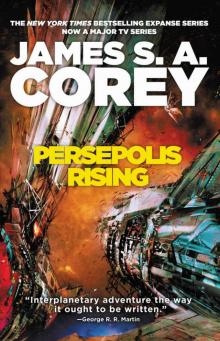 Persepolis Rising (The Expanse)
Persepolis Rising (The Expanse) Caliban's War: Book Two of the Expanse series
Caliban's War: Book Two of the Expanse series Leviathan Wakes: Book One of The Expanse
Leviathan Wakes: Book One of The Expanse Cibola Burn (Expanse)
Cibola Burn (Expanse) Strange Dogs (Expanse)
Strange Dogs (Expanse) The Vital Abyss: An Expanse Novella (The Expanse)
The Vital Abyss: An Expanse Novella (The Expanse)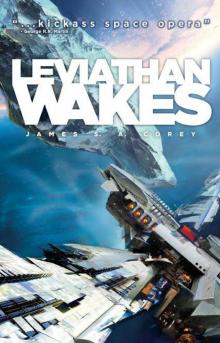 Leviathan Wakes e-1
Leviathan Wakes e-1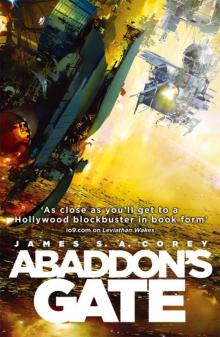 Abaddon's Gate e-3
Abaddon's Gate e-3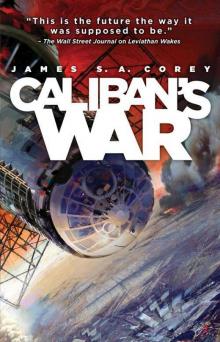 Caliban;s war e-2
Caliban;s war e-2 Gods of Risk: An Expanse Novella
Gods of Risk: An Expanse Novella Honor Among Thieves: Star Wars (Empire and Rebellion)
Honor Among Thieves: Star Wars (Empire and Rebellion)